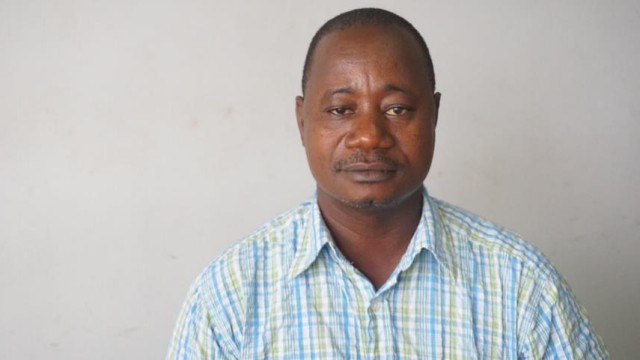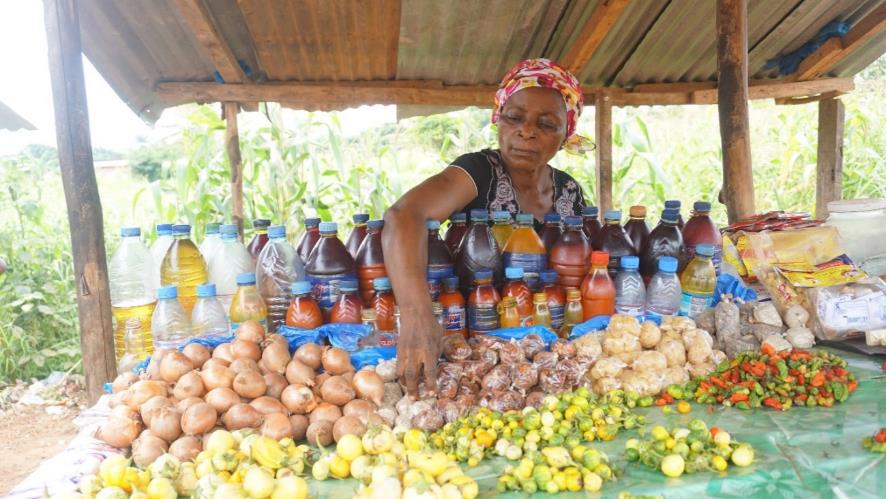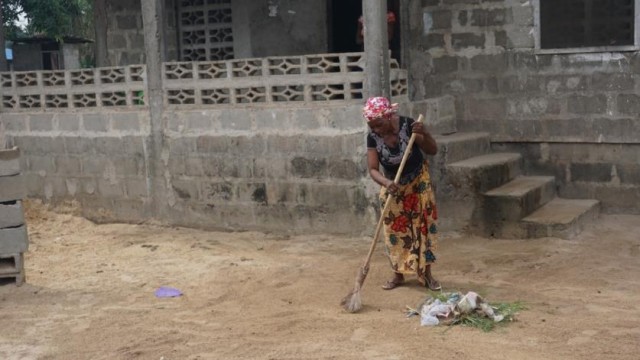PAYNESVILLE, Montserrado – Esther Meapeh had just returned from the Chinese cold storage market in the Neezoe community outside Monrovia where she sells bitter balls, peppers, palm oil, and onions.
She left her 22-year-old daughter suffering from epilepsy to look after the table market. Ma Esther, as she is affectionately known in her community, has been helping her daughter battle epilepsy for over fifteen years, even with limited resources.
After being tipped off by community members that Meapeh lived in the neighborhood with her daughter, a young boy helped pinpoint the exact location of the family.
Not one to welcome strangers in a disheveled home, Meapeh had quickly hurried from the market to sweep the yard because her other children had not done so for the day.
“Who is looking for me?†she asked.
The 50-year-old Meapeh said she lives in the house with eight other occupants, including her now jobless husband.
Prior to her family relocating from the Topoe Village community, Meapeh’s daughter, Rebecca, never had epilepsy.
“The epilepsy started on my daughter in 2001 as a grade four student after our relocation from Topoe Village to Nezoe community,†she said.
Rebecca was rushed to a nearby clinic one morning due on a bout with malaria. However, the family discovered that malaria was not all Rebecca was going through.
Meapeh said she also took her daughter to the Edward S. Grant Mental hospital in Duport Road and nurses there prescribed several different drugs to treat her daughter’s epilepsy, including phenobarbital and carbamazepine.
She explained that Rebecca was also taken to several religious leaders for prayer, but that did not help her situation. Rebecca must now be on medication on a daily basis.
Due to the gravity and disruptiveness of her illness, Meapeh said her daughter was always sent home from school and eventually dropped out.
“I feel very bad whenever I see my daughter’s friends going to school,†the mother said.
According to the nurses’ prescription, Rebecca would need to take two 200mg carbamazepine tablets a day to stabilize her condition. Meapeh estimates that a month’s worth of medication costs her L$1,500 (US$13.88).
Because Meapeh’s only source of income for her family is through her market, she said her daughter experienced relapse on a daily basis. The constant falls as a result of the seizures have placed a lot of wounds on Rebecca’s body.
Adding more frustration to the present burden on her mother, Rebecca is also two and half months pregnant.
“The news about my daughter’s pregnancy has brought more worries to me,†Meapeh added. “The purchasing of drugs for my daughter has become a huge burden for me.â€
Both Meapeh and her daughter are also asking authorities at the Health Ministry to help her daughter with medications.
Joseph S. Quoi, a pharmacist of mental health programs at the Ministry of Health, told The Bush Chicken that there is an increase in epilepsy relapse cases in the country, particularly in the southeastern region.

Joseph S. Quoi, pharmacist for the Mental Health Program at the Ministry of Health. Photo: Zeze Ballah
He said epilepsy medications such as carbamazepine, valproic acid, and phenobarbital tablets are frequently out of stock.
“Epilepsy patients who have been on these medications and stable for two or more years are now experiencing relapse because of the lack of the medications in the country,†he said.
Even though the medications are not meant to cure the diseases, they provide an important stabilizing effect. Quoi said the alarming epilepsy relapse cases should now grab the immediate attention of all Liberians, not only those who are concerned about mental health.
Quoi said on two different occasions, he submitted a procurement plan for the purchasing of some neuropsychiatric medications to the procurement unit at the ministry, adding that he has been told that such plan is in process.
The pharmacist at the mental health program pointed out the urgency to procure these anti-epilepsy medications. He said if nothing is done to address the stock of epilepsy medication across the country, the adverse effect will be on the entire society and not just the parents of those suffering from epilepsy.
He appealed to the relevant government officials who allocate resources to programs to see mental health programs as important as any other programs in the country, noting, “There is no health without mental health.â€
Featured photo by Zeze Ballah




